Chicago Blu-ray Movie
HomeChicago Blu-ray Movie 
Disney / Buena Vista | 2002 | 113 min | Rated PG-13 | Jan 23, 2007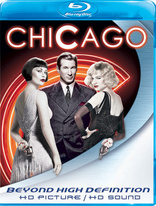
Movie rating
7.3 | / 10 |
Blu-ray rating
| Users | 4.2 | |
| Reviewer | 4.0 | |
| Overall | 4.2 |
Overview
Chicago (2002)
At a time when crimes of passion result in celebrity headlines, nightclub sensation Velma Kelly and spotlight-seeking Roxie Hart both find themselves sharing space on Chicago's famed Murderess Row! They also share Billy Flynn, the town's slickest lawyer with a talent for turning notorious defendants into local legends. But in Chicago there's only room for one legend!
Starring: Renée Zellweger, Catherine Zeta-Jones, Richard Gere, Queen Latifah, John C. ReillyDirector: Rob Marshall
| Comedy | Uncertain |
| Musical | Uncertain |
| Period | Uncertain |
| Drama | Uncertain |
| Crime | Uncertain |
Specifications
Video
Video codec: MPEG-4 AVC
Video resolution: 1080p
Aspect ratio: 1.85:1
Original aspect ratio: 1.85:1
Audio
English: LPCM 5.1 (48kHz, 24-bit)
English: Dolby Digital 5.1 (640 kbps)
French: Dolby Digital 5.1 (640 kbps)
Spanish: LPCM 2.0
Subtitles
English SDH, French, Spanish
Discs
50GB Blu-ray Disc
Single disc (1 BD)
Playback
Region free
Review
Rating summary
| Movie | 4.0 | |
| Video | 4.0 | |
| Audio | 5.0 | |
| Extras | 3.5 | |
| Overall | 4.0 |
Chicago Blu-ray Movie Review
'Chicago' reinvigorated the musical film a few years ago. Does it still hold up in hindsight?
Reviewed by Jeffrey Kauffman December 21, 2009For those of you who were lucky enough to catch a Bob Fosse staged show on Broadway, you’ll know what I mean
when I say, both unashamedly and unabashedly, that the master showman’s touch could literally change your life. I
was a kid when I visited family in New York City and through one of my Uncles’ connections was able to get front row
tickets for Pippin, a show that was then playing to standing room only audiences. With an incredible cast
including John Rubinstein, Jill Clayburgh, Ben Vereen, and The Beverly Hillbillies’ own “Granny,” Irene Ryan,
Pippin was one of the first major Broadway musicals to utilize television advertising to cement its box office
appeal. Why the show took a while to really catch fire is anyone’s guess, but I can tell you as a youngster sitting in the
audience that night, at my first ever Broadway musical (as opposed to touring or bus and truck productions), I was
awestruck by the genius Fosse employed throughout the staging. From the first moment, where the entire proscenium
was aglow with blacklit gloved hands, through two hours of unbelievably brilliant choreography and stagecraft, I simply
could not believe my eyes. Fosse ultimately became something of a born again wunderkind that year, with
Pippin winning him two Tony Awards, his film version of Cabaret netting him an Oscar, and his television
special Liza With a Z handing him an Emmy, a rare example of an artist managing a triple crown of major awards
in little more than a year.
Though Fosse worked on a couple of special theatrical presentations after Pippin, his next “real” musical was
1975’s Chicago, a show that actually opened to better reviews than Pippin had, and which went on to a
substantial, multi-year run, but which in one of those strange vagaries of history, got somewhat buried under the
onslaught of a little show (and critical darling) called A Chorus Line. Though Chicago’s original Broadway
iteration had the incredible talents of Jerry Orbach, Gwen Verdon (the ex-Mrs. Fosse, of course) and Chita Rivera, and
featured a marvelous pastiche laden score by the great John Kander and Fred Ebb (of Cabaret fame), it
seemed fated to reside in that strange netherworld of fairly successful shows which nonetheless never rise to the level
of an unforgettable classic. That was the case, anyway, until over two decades after the original version
opened, when in 1996 a new, stripped down production opened to rave reviews and pretty much unanimous audience
acclaim. That production, incredibly, is still running today (with different stars, obviously), having gotten well past the
5,000 performance mark. Finally Hollywood stood up and took notice of the property in real terms (it had been bandied
about from studio to studio for years, including with Fosse himself attached to direct). But there really hadn’t been a
successful film musical in years, and no one knew how to translate Chicago’s unabashed theatricality to film (the
show is told as a succession of vaudeville “acts” in its original Broadway version). Attempt after attempt to make the
property filmically viable ended in failure, until finally director Rob Marshall hit upon the idea which enabled the project to
both stay true to its roots and also exploit the medium of cinema.
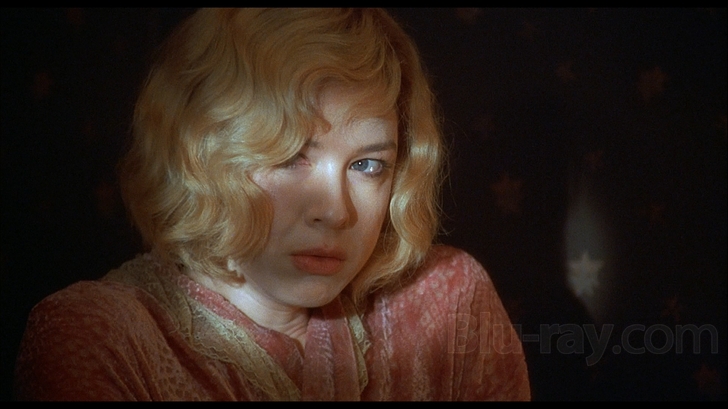
Renee Zellweger is Roxie Hart
My hunch is your reaction to the film version of Chicago is going to be based more or less largely upon your age and personal experience with film musicals. As much as I may raise the hackles of some readers, I am not one of those who gives Chicago in its film version unqualified raves. Marshall’s at least understandable decision to place all the musical sequences in the mind’s eye of "murderess" Roxie Hart (Renee Zellweger) perhaps goes down more easily with younger folk for whom the patent unreality of seeing someone suddenly break out into song disrupts their attention and the flow of the film. I grew up at the tail end of the great era of film musicals, and never really thought too much about how odd it was to see Julie Andrews burst into song, for example. I personally find this “cheat” on the part of Marshall ultimately fine, but at the same time troubling for the show’s central thesis that the tabloidization of tragedy is a showbiz phenomenon in and of itself. (It should be noted for those of you who aren’t aware that the musical is culled from the great straight play Chicago which was adapted into the marvelous Ginger Rogers romp Roxie Hart back in the 1940’s, proving that PR machines are not something endemic to our current generation). Having everything, musical comedy wise, exist only in the recesses of Hart’s mind completely robs the show of some of its satiric edge, one of the strong points of the original musical book by Fosse and Ebb.
Also at least a little troubling to semi-old fogeys like myself is the breakneck pace of the editing, especially in the dance sequences. Take a look at any of the three great film musicals Fosse himself helmed, Sweet Charity, Cabaret, or All that Jazz (whose title, of course, is derived from one of the songs from Chicago). While Jazz did in fact prefigure some of this quick cutting, Fosse never cheated the audience in terms of being able to see clearly that dancers were performing sequences whole, without the benefit of short, sometimes seconds-long, takes perhaps helping to cover any terpsichorean gaffes. Even more impressive in this regard are the phenomenally long takes in Cabaret and especially Sweet Charity where the viewer is able to see clearly Fosse’s incredibly organic choreographic style, performed by dancers of his own choosing and under his own tutelage. There’s nothing wrong per se with Chicago’s rapid fire approach to these “faux-se” dances, but cynics like myself can’t help but wonder how many three second long takes of certain moments had to be filmed to get everything “just right.”
With these perhaps curmudgeonly caveats aside, Chicago as a film does come closer than any recent effort in recreating the thrill and visceral excitement of the best film musicals of yore. Oscar winner Catherine Zeta-Jones brings flash and panache to her scheming Velma Kelly. Zellweger is sweet and yet somewhat sinister as Hart, and Richard Gere is surprisingly spry and affable as shyster Billy Flynn. Supporting cast members are uniformly excellent, including great star turns by Queen Latifah and John Reilly.
Marshall is up to bat again right now with another film musical based on a Broadway success, Nine, and evidently again is using the Chicago “fantasy” element to clothe his musical numbers. This may actually play a little better with that property, as it is by nature caught up in the artifice of memory and filmmaking, and so is perhaps better suited to the “mind’s eye” approach. I can’t help but wish, though, that filmmakers had enough faith in their audiences to just, in those great words of Rooney and Garland, “put on a show” without this psycho-babble artifice. After all, kids born since the heyday of the great musicals grew up with MTV, for crying out loud, and so shouldn’t be too shocked to see someone break out into song. Marshall at least has command of his camera and stages the musical numbers with flair and aplomb, bringing a certain consistent momentum to the film’s many sung moments.
The sad part of Chicago, the film, is wondering what Fosse himself might have made of it. Probably no director of the past 50 years was as blatantly theatrical or as innovative with adapting musicals to film than was Fosse. If some of his neomodern escapades in Sweet Charity seem quaintly old fashioned to us now, his post-modernist revision of Cabaret, and his bitterly vicious self-examination in All that Jazz, prove that he was a master of rare insight and perhaps more importantly, technique. If Rob Marshall is a sort of pale imitation of the original, he at least had the good sense not to jettison Fosse’s jaded eye and “jazz hands.”
Chicago Blu-ray Movie, Video Quality 
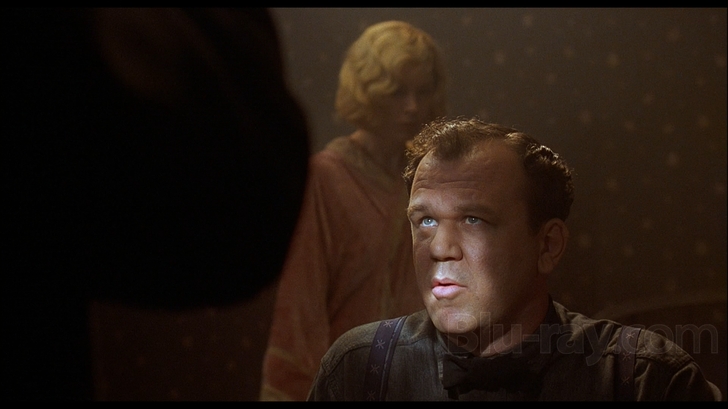
Despite being released relatively early in the Blu-ray era, Chicago looks decently sharp in its 1080p/AVC encoded transfer, with a couple of notable exceptions. Marshall's "mind's eye" gambit means that virtually all of the musical numbers play out on large, largely darkened spaces, where contrast has been pumped, giving a slightly unreal look to the sequences. While colors never bloom, grain is somewhat more apparent in some of these sequences than in the "real life" moments. While the bulk of the film is sharp as a tack, sometimes there's a hint of softness, as in the first apartment scene with Zellweger and Reilly. Overall, though, colors pop nicely, with some great, wonderfully saturated reds really standing out nicely against the black backdrops. Fleshtones are lifelike, and there is no apparent DNR.
Chicago Blu-ray Movie, Audio Quality 
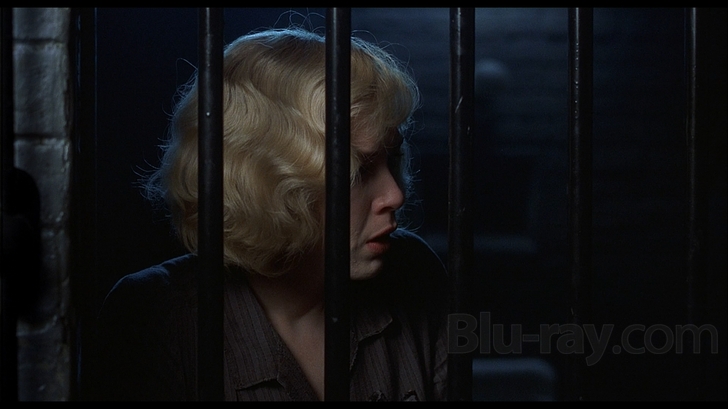
Chicago really excels in its superb uncompressed LPCM 5.1 mix. Kander and Ebb's score wafts through the surround channels with appealing warmth and bombast, and all of the voices sound wonderfully clear and at times surprisingly nuanced. Directionality is really most apparent in some of the ambient environmental sounds as well as dialogue. Some of the court scenes, for example, utilize really excellent channel separation, envelloping the listener in a very real seeming sound world. Surround channels also tend to kick in in the "paparazzi" moments, when Hart's sudden realization that her "claim to fame" is coming perhaps nightmarishly true immerses her, and the audience, in the madness of the raging sounds of hangers on. Fidelity is wonderfully precise throughout all frequencies, with everything well balanced and lacking any distortion. This is a very compelling sound mix, very worthy of its Oscar win.
Chicago Blu-ray Movie, Special Features and Extras 
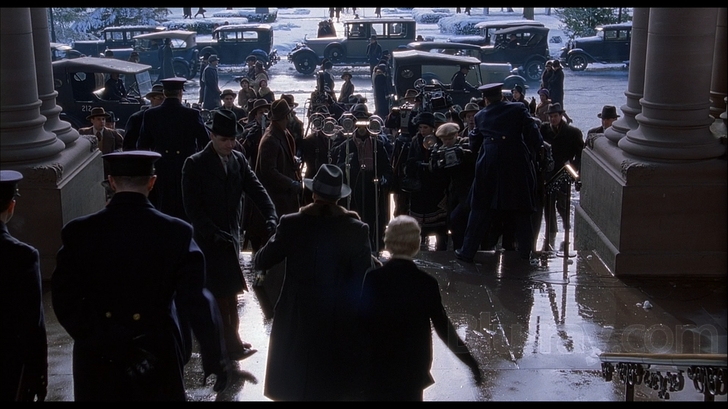
Almost all of the supplements from the "Razzle Dazzle" 2 DVD special edition have been ported over to this Blu-ray:
- Feature commentary with director Rob Marshall and screenwriter Bill Condon. An interesting and above average trip through the film with the co-creators talking about their aims and the challenges of adapting the property for film.
- Movie Showcase. One of the early add-ons to Blu-rays, now wisely jettisoned, this is a useless highlighting of the "best" high def scenes from the film.
- Class. One of the funniest bits from the original stage version gets an alternate treatment here.
- From Stage To Screen: The History of Chicago (27 minutes). An interesting, if not always strictly accurate, look at the history of the stage version. (The original was nowhere near a flop, running for almost three years. That said, it certainly didn't have the cachet of the 1996 revival).
- Behind The Scenes Special. (30 minutes). A standard making-of featurette.
- Extended/Alternate Musical Performances. This supplement offers extended versions of "All That Jazz," "When You're Good To Mama," "Cell Block Tango," "We Both Reached For The Gun," "Mister Cellophane," and "All I Care About." Additional sections feature interviews and rehearsals, including "All I Care About," "Nowadays," "All That Jazz," "We Can't Do It Alone," "Hot Honey Rag," "We Both Reached For The Gun," and "Cell Block Tango."
- An Intimate Look at Director Rob Marshall. (11 minutes). Despite featuring Zellweger and Reilly, this is a bit too self-congratulatory for my own taste and made me wonder if Marshall himself crafted it.
- When Liza Minnelli Became Roxie Hart. (6 minutes). Liza did indeed replace Gwen Verdon for part of the run and that's well detailed here, including some great vintage footage of Ms. Minnelli (not from the show).
- Academy Award-Winning Production Designer John Myhre. (6 minutes) An interesting, if brief, look at recreating the show's quasi-thirties feel.
- Academy Award-Winning Costume Designer Colleen Atwood. (6 minutes). A similarly interesting, if similarly brief, look at the great costumes which are a highlight of the film.
Chicago Blu-ray Movie, Overall Score and Recommendation 
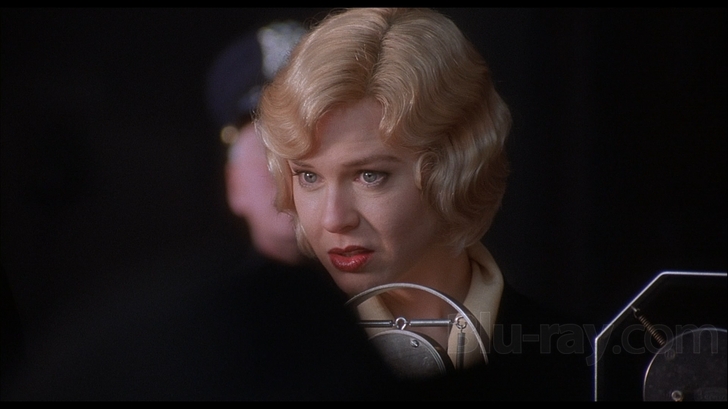
Chicago may have lost a little of its lustre in the intervening years since its release. Marshall's mind's eye gambit may rub theatrical purists the wrong way, but taken on its own terms, this film delivers a lot of the stage version's razzle dazzle, if without the acerbity of Fosse's original.
Other editions
Chicago: Other Editions
Similar titles
Similar titles you might also like

Rent
2005

Hairspray
2-Disc Shake and Shimmy Edition
2007

Dreamgirls
2-Disc Showstopper Edition
2006

Burlesque
2010

Glee: The Complete First Season
2009-2010

Across the Universe
2007

Thoroughly Modern Millie
1967

Robin and the 7 Hoods
1964

Mamma Mia! Here We Go Again
Sing-Along Edition
2018

Funny Girl 4K
1968

Hello, Dolly!
Fox Studio Classics
1969

Mamma Mia! 4K
10th Anniversary Edition
2008

Grease 2
1982

Singin' in the Rain 4K
70th Anniversary Edition
1952

Guys and Dolls
Warner Archive Collection
1955

Camp
2003

The Producers
2005

There's No Business Like Show Business
1954

Rock of Ages
2012

The Last Five Years
2014




